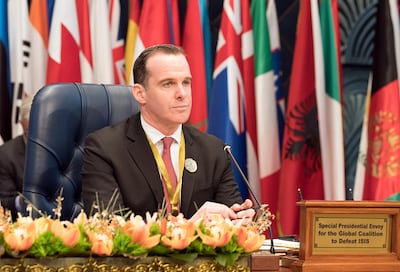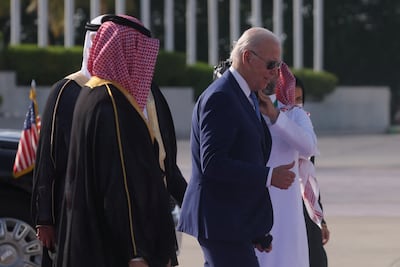In a speech at the Atlantic Council in Washington last week, White House co-ordinator for the Middle East and North Africa Brett McGurk outlined an emerging "Biden doctrine" that "guides US engagement" in the Middle East. Any declaration which is that sweeping deserves to be carefully unpacked.
Mr McGurk outlined “five declaratory principles", effectively restating much of what was already laid out in the National Security Strategy issued in October 2022. These five principles are partnerships, deterrence, diplomacy, integration and US values.
Both the McGurk speech and the NSS begin with partnerships, evidently to emphasise the centrality of collaboration for the Biden doctrine in the Middle East.

The Ukraine war has helped the Biden administration and most serious strategic thinkers in Washington to reconsider the strategic importance of South-West Asia to US foreign policy. Energy exports from the Gulf region and the three key waterways, the Red Sea, the Arabian Sea and the Arabian Gulf, plus their three key chokepoints, the Suez Canal, Bab Al Mandab and the Strait of Hormuz, are unmistakably central to any global regime of stability, security and prosperity.
Washington's role as the guarantor of maritime security and unimpeded international access to these arteries that carry so much of the lifeblood of the global economy is now viewed as a key asset for imperatives ranging from maintaining what is left of the beleaguered rules-based global order to great power competition with China.
The Biden administration deserves credit for recognising, particularly after the invasion of Ukraine, not only the centrality of this region to the US global posture but also the centrality of local partners in realising such security and stability. The equation drawing the US close to its Gulf Arab and other Middle Eastern partners is no longer anything resembling "oil for security" – if, indeed, it ever was that. Instead, on both sides, it is increasingly viewed as a partnership necessary to achieve mutual goals even if they are being pursued for different reasons. That is a lot more like the US relationship with its Nato partners, Japan or South Korea.
Therefore, while the 1980 Carter Doctrine held that the US would use all means to prevent any outside force to gain control of the Arabian Gulf region, the Biden doctrine pledges that the US will "make sure those countries can defend themselves against foreign threats", and “will not allow foreign or regional powers to jeopardise freedom of navigation through the Middle East’s waterways". The greater shift towards burden sharing and mutuality is evident, even though the Biden administration maintains it "will not tolerate efforts by any country to dominate another – or the region – through military build-ups, incursions or threats".
Co-operation such as the maritime surveillance and security projects being overseen by the US Navy's Task Force 59, which are heavily reliant on regional partners, recognise that Gulf Arab countries like Saudi Arabia and the UAE have emerged as mid-level regional, and to some extent international, powers. This new emphasis on partnerships provides Washington's Middle East allies ample scope to, for example, develop much greater ties with China without threatening the overarching strategic relationship with the US, as long as those measures don't provide Beijing with an undue strategic foothold in the region.

Moreover, the emphasis on partnerships promotes closer bilateral and multilateral relations among traditional US partners, most obviously the Abraham Accords between a number of Arab countries and Israel.
Mr McGurk was quick to add deterrence to the list and left no doubt this primarily concerns Iran. With nuclear talks having broken down, Washington has been quietly developing a new regime of containment against Tehran that seeks to restrain its destructive regional activities and prepare for any Iranian sprint towards nuclear weapons construction.
Yet he emphasised the administration's commitment to diplomacy, which is serious. However, Mr McGurk and many other key officials, including the president, participated in the two Obama administrations and appeared to have learnt key lessons about the limitations of how much American goodwill can achieve in the face of implacable opposition.
The fourth principle is integration, which may be the biggest innovation of Mr Biden's Middle East approach. Mr McGurk claimed the US is at last developing “an integrated air and maritime defence architecture in the region". Regarding air and missile defences, this crucial goal appears to remain largely aspirational, though some limited progress is being made. But the administration is right to believe that such a system is crucial to the national security of many of its regional partners, not least Gulf Arab countries. More integrated regional infrastructure is surely the best way to give the current climate of de-escalation in the Middle East more staying power by providing incentives to avoid conflict and confrontation.
The fifth principle of values rightly comes last. It is not that the US does not want, or even try, to promote its values. But major efforts to emphasise that, whether by force when the George W Bush administration invaded Iraq or maladroit efforts by the Barack Obama administration to create a new dynamic between the US and the Arab and Muslim worlds, ended up looking phony and misguided, respectively, and in both cases wholly ineffectual.
The Biden administration is wise not to over-promise on promoting values it cannot realise in practice, while reiterating that Washington does, in fact, believe what it preaches. Indeed, the Biden doctrine crucially recognises several key realities: the centrality of partnerships to achieving plausible and necessary goals in the region; traditional partners emerging as regional actors in their own right in the context of a developing multipolar reality; and that diplomacy and integration provide the greatest opportunity for advancing security and stability.
The emphasis on partnerships, integration and diplomacy promote burden sharing and in time should allow the US to right-size its regional force posture and do more with less. Much of the current configuration is a legacy of the 2003 invasion and subsequent occupation of Iraq. It doesn't correspond to most present-day missions and threats and appears more of a relic of a bygone era.
The "Biden doctrine" may not be an innovation or even much of a doctrine. But it is serious and sound. That is probably as much as anyone can hope for. Given the fate of more ambitious Middle East policy agendas by recent administrations, less is decidedly more.


